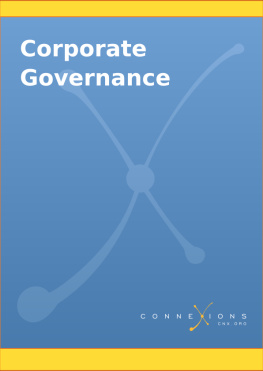Contents
Guide
Page List
If you enjoyed this book, discover your next great read with the following excerpt.

1
Were Businesspeople, but First Were People

Be faithful in small things because it is in them that your strength lies.
MOTHER TERESA
This is a book about leadership in action. Small actions, to be specific. These gestures, or decencies, are available to you immediately. People at every level of the organization have access to an unlimited number of them. These decencies generally require neither permission nor a budget. What they do require is action.
I believe that a companys culture can be moldedand for the betterby the cumulative power of small actions. But at its heart, this book is about the way we as leaders choose to behavethe actions we embraceevery day, especially during the quiet moments when we think no one is looking. So to begin, lets start not with theory but with a story of a simple act of decency that caught me by surprise, changed the way I related to my colleagues, and shifted, however slightly, the culture of my company for the better.
That company is Lee Hecht Harrison, a New Jerseybased career management firm specializing primarily in outplacement, the process of helping organizations and their employees deal with the effects of job loss. A few years ago, with the company growing quickly, the time was right to appoint a new chief operating officer. I wanted Ray, a West Point graduate and an MBA who had recently retired from the U.S. Army with the rank of brigadier general, to get to know our company. So we scheduled a tour, starting with several branch offices in the Northeast. At midmorning, we arrived at our first stop and passed through the glass doors into the familiar reception area. As usual, Melissa, the receptionist, was on duty.
How are you, Melissa? I asked casually.
Fine. And you, Steve?
Great. Have a good day.
You too.
I then proceeded toward the interior offices. Suddenly I found myself being pulled back into the reception area.
Whats wrong? I asked Ray.
Ray said nothing, but guided me back to the reception desk. Then I watched as Ray made an ally and a memory. The first thing Ray did was stick out his right hand, a gesture reinforced by his charismatic smile that generated enough electricity to power a small town, and said, Good morning, Melissa, Im Ray. Its so great to meet you!
After introducing himself, Ray launched into a dialogue with Melissa. How long have you been with us? How did you hear about us? What did you do before you joined our firm? What kind of dog is that in the picture? What do you think of this business were in together? But it wasnt only one-way questions. He asked if Melissa had questions, and he answered them candidly. Melissa was obviously delighted with the exchange.
Well, nice to meet you, Ray said. I look forward to seeing you next time Im in. And as we went inside for our meeting, he said, Keep doin what youre doin, Melissa. We need you!
As I closed the door to the meeting area, I looked at Ray. What was that all about? He answered: Its called the two-minute schmooze. Our receptionists meet or talk by phone to more people critical to our company in one day than you or I will meet in the course of a year: people at all levels, from all of our branches everywhere, our customers, our suppliers, our colleagues, our bosses, our applicants and job-seekers. Melissa and the dozens like her are nothing less than our concierge desk. They control our reputation. And anyway, its a decent thing to do. Just the decent thing to do.
The decent thing to do. Of course I had heard the words before, but I hadnt put them in the context of how we act at work. Rays two-minute schmooze is how I first learned of the power of small decencies, and its a perfect illustration of decent leadership and the impact it has on organizations. Organizations have a feel about them, says Charles Handy in The Hungry Spirit. Small decencies release that feel, a feel which the visitor picks up as soon as he or she enters the building or, often merely encounters one of the people who work there.
THE POWER OF DECENCY
Even though treating others with humanity and respect is time-less, John Cowan may have been the first to bring the concept explicitly into the workplace. In his book Small Decencies, Cowan writes:
As I come in the door of a business for the first time, I automatically check for the telltales. Is there a place for the visitors coat? Am I offered a cup of coffee? Am I an interruption to the receptionist or a welcome guest? Am I to wait for my appointment, or does the person who called me in arrive immediately and with enthusiasm at my appearance? Is the phone put on hold? Is there time to talk? A place on the table for my notebook? Adjustments made for my well-being?
These things are inconsequential by themselves... But as an indicator of the spirit of the person I am meeting, or the culture of the business I am dealing with, these small decencies are excellent telltales. Their absence screams of personal disrespect, harried and overworked people, a harsh or cold atmosphere, an environment corrosive to the human spirit. Their presence almost infallibly suggests attention to the needs of people beyond the need for a cup of hot coffee.
How to create and sustain an ethical and compliant culture through the deployment of decencies is the main concern of this book. The common thread is that ethical behavior is almost the inadvertent side effect of focusing on something else in addition to generating results. Lets focus, instead, on small business decencies for their own sake precisely because doing so brings meaning to the workplace. If we do that, if we offer decencies for their own sake without expecting a specific outcome, I believe that the corporate cultures in which we operate will grow in the ways we desire.
The acid test Cowan suggests, is this: Think of your children or cherished loved ones. Would you want your son or daughter to live in your corporation? To be shaped by it? Small decencies remind us that we can be true to our values both at home and at work, and that the more humanely we treat one another, the better we will be as people, and the better we will be in doing our lifes work. All this is by way of saying that we are businesspeople, but first were people. We are colleagues who can make a difference in another persons day, and were people who want to be treated with respect, humanity, and caring. Out of such actions, multiplied dozens of times a day over a period of time, corporate cultures take root and sprout a thousand points of light.
Ted Koppel, one of the great journalists of our time, underscored the importance of small decencies in the power of individuals to make a difference. Speaking to the graduates of Stanford University in 1998, he referred to the small acts of courage and kindness that are required to challenge practices and institutions that limit human possibilities:
We will not change whats wrong with our culture through legislation, or by choosing up sides on the basis of personal popularity or party affiliation. We will change it by small acts of courage and kindness; by recognizing, each of us, his or her own obligation to set a proper example.
Aspire to decency. Practice civility toward one another. Admire and emulate ethical behavior wherever you find it. Apply a rigid standard of morality to your lives; and if, periodically, you fail as you surely will, adjust your lives, not the standards.







